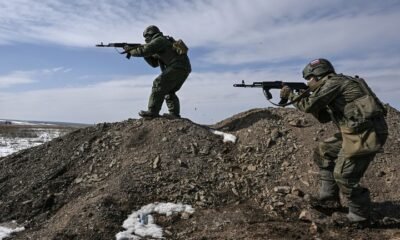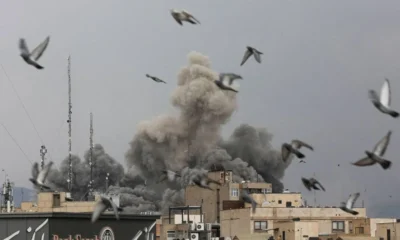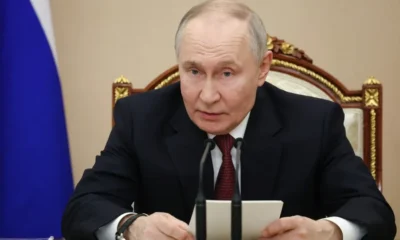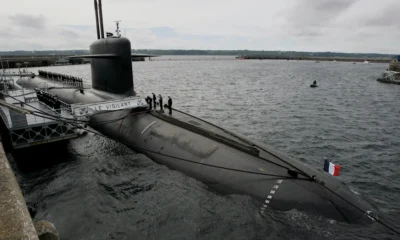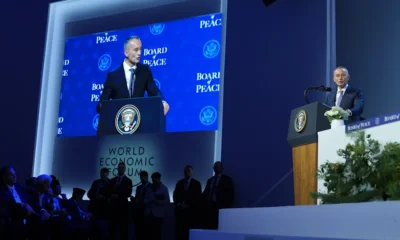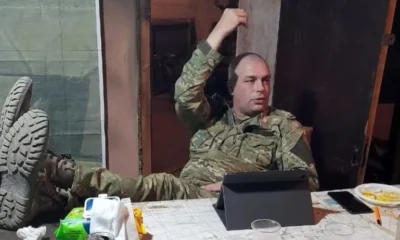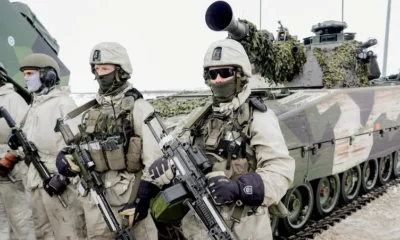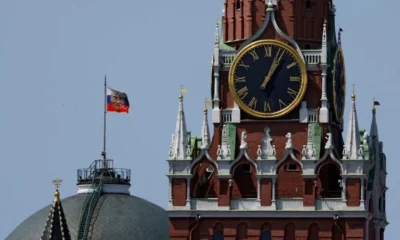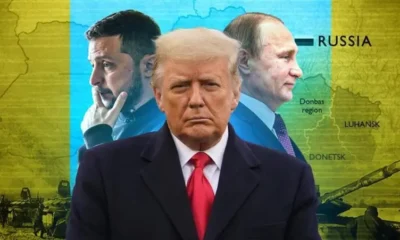NATO
Macron Signals NATO Spending Target Insufficient as Trump Eyes European Exit

French President Pushes for Higher Defense Spending and European Military Independence Amid U.S. Withdrawal Fears
French President Emmanuel Macron has warned that Europe must prepare for a potential U.S. military withdrawal from the continent, suggesting that NATO’s current defense spending target of 2% of GDP is no longer sufficient. Speaking just before Donald Trump’s inauguration, Macron hinted at the need for a significant increase in defense investment, signaling a shift in France’s approach to European security.
“France currently exceeds 2 percent of GDP for defense spending,” Macron stated during his New Year’s address to the armed forces. “But is that enough to achieve the mass, depth, and innovation to defend ourselves in a major confrontation? Is that enough to organize ourselves on a European scale and have the means to fight?”
Macron’s remarks come amid mounting fears of reduced U.S. engagement in European defense. Trump has repeatedly criticized NATO allies for not meeting spending obligations and recently called for members to allocate 5% of GDP to defense. Eastern European nations like Poland and Lithuania have expressed support for this proposal, given their proximity to Russia and the ongoing conflict in Ukraine.
A Looming U.S. Withdrawal?
Macron posed critical questions about Europe’s readiness to act independently if the U.S. repositions its military focus. “What will we do in Europe tomorrow if our American ally withdraws its warships from the Mediterranean? What if [the U.S.] switches its fighter planes from the Atlantic to the Pacific?” Macron asked, signaling the urgency for Europe to bolster its own defense capabilities.
Trump’s nominee for Secretary of Defense, Pete Hegseth, reinforced the U.S. stance last week, stating NATO allies must demonstrate their commitment to Article 3, which mandates adequate preparedness for crises.
The Push for European Defense Autonomy
In 2024, France met NATO’s 2% spending target for the first time since it was introduced in 2014. However, Macron emphasized that any future increases in defense spending must prioritize European defense industries, not American contractors.
“France defends and will continue to defend European preference” in arms procurement, Macron declared, advocating for the consolidation of Europe’s fragmented defense sector. He pointed to the disparity between U.S. and European military platforms: Europe has 62 main land warfare systems compared to just eight in the U.S., and 47 naval platforms compared to six in the U.S.
To address this fragmentation, Macron called for “European champions” in defense manufacturing, highlighting joint projects like tanks, air defense systems, and missile programs as critical to Europe’s global competitiveness. He also praised the recent joint venture between Germany’s Rheinmetall and Italy’s Leonardo to produce tanks and armored vehicles as a step toward greater industry integration.
A New NATO Spending Target?
As NATO prepares for its June summit in The Hague, member states are expected to agree on a higher defense spending target, with Secretary-General Mark Rutte suggesting it could exceed 3% of GDP. Macron indicated that France would back this increase if it strengthens Europe’s military autonomy, signaling a shift in priorities from transatlantic reliance to regional self-reliance.
Macron’s vision for Europe is clear: a defense strategy less dependent on the U.S. and built on a unified European industrial base. While his comments reflect a pragmatic approach to the possibility of U.S. disengagement, they also underscore the challenges of transforming Europe’s defense infrastructure.
As Trump’s administration takes shape and NATO debates its future, Macron’s push for a more self-sufficient Europe could mark a turning point in transatlantic relations, potentially reshaping the balance of global power. Whether European nations can rise to the occasion remains to be seen, but the stakes for the continent’s security have never been higher.

-

 Somaliland1 month ago
Somaliland1 month agoF-35s Over Hargeisa: The Night Somaliland’s Sovereignty Went Supersonic
-

 Somalia1 month ago
Somalia1 month agoAid Destroyed, Trust Shattered: Somalia Loses U.S. Support for Good
-

 Terrorism2 months ago
Terrorism2 months agoForeign ISIS Pipeline Exposed: Puntland Captures Dozens of Non-Somali Fighters
-

 Somaliland1 month ago
Somaliland1 month agoSomaliland at Davos: The Moment Somaliland Entered the World’s Inner Circle
-

 Terrorism1 month ago
Terrorism1 month agoAmerica Pulls Back From Somalia but Doubles Down Next Door
-

 Top stories2 months ago
Top stories2 months agoSomali Pirates Hijack Chinese Fishing Vessel off Puntland Coast
-

 Opinion2 months ago
Opinion2 months agoTurkey’s Selective Morality: From the Ruins of Gaza to the Red Sea
-

 Middle East2 months ago
Middle East2 months agoUS War Plans Against Iran Enter Advanced Stage

